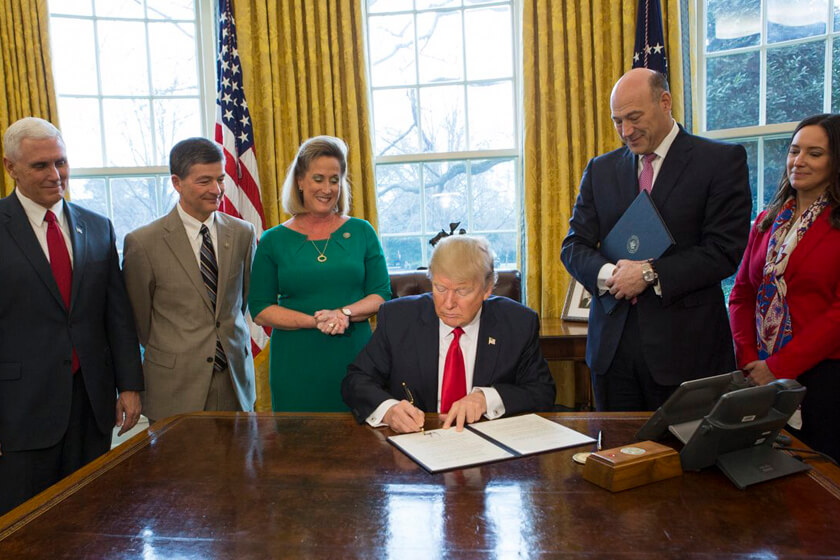West Long Branch, NJ – Donald Trump earns a split decision on his job performance so far according to the latest national Monmouth University Poll . The American public feels he is giving about as much attention to their concerns as he is to hot-button ideological issues, although most wish he would concentrate more on bread-and-butter issues. Recent revelations regarding administration contacts with Russian officials during the campaign has not moved the needle much, including a divided verdict on whether the attorney general should resign. Similarly, the president’s widely hailed address to Congress did little to change the dynamic of public opinion.
After six weeks in office, 43% of the American public approve of the job Pres. Trump has been doing while a similar 46% disapprove. This is Monmouth’s first job approval rating of Trump since he was sworn in as president.
The 2016 election was decided by a matter of degrees. The vast majority of counties gave either Trump or Hillary Clinton a double digit victory margin. The president has a solid 55% approve and 33% disapprove rating among residents of the nearly 2,500 counties that gave Trump a victory margin of ten points or more. He is upside down – 33% approve and 57% disapprove – among residents of the more than 400 counties he lost by ten points or more.
Opinion is divided at 41% approve and 46% disapprove among residents of the just over 300 counties where the 2016 winning margin was in the single digits. There is very little difference in opinion in these “swing counties” based on which candidate won there. In just over half of these counties that were won by Trump, his job rating stands at 43% approve and 48% disapprove. Among the remaining swing counties won by Hillary Clinton, 40% of residents approve of Trump’s job performance and 44% disapprove.
“Public opinion in those swing counties will be extremely important to the success of Trump’s presidency. Right now, it could go either way,” said Patrick Murray, director of the independent Monmouth University Polling Institute in West Long Branch, New Jersey.
There are other wide demographic gaps in opinion of the president’s performance. Unsurprisingly, 80% of self-identified Republicans approve while 82% of Democrats disapprove. Independents are evenly split at 43% approve and 43% disapprove. White non-Hispanic Americans approve by a 55% to 35% margin but two-thirds (69%) of non-white or Hispanic adults disapprove and only 19% approve. Trump gets a positive 49% to 40% rating from men but a negative 36% to 53% rating among women.
The past week saw significant swings in the headlines, going from the president’s address to Congress, to the attorney general’s problems, to allegations that the Obama administration spied on Trump. The poll saw little movement in public opinion as these stories developed. In interviews conducted Thursday and Friday, Trump earned a 41% approve and 47% disapprove rating. In Saturday and Sunday interviews – after Trump’s tweet storm about the spying accusations – the president got a 44% approve and 46% disapprove rating. These minor differences are not statistically significant.
“The public seems to be much more measured in its response to the daily tumult that is the Trump administration than most pundits are,” said Murray.
The Monmouth University Poll has not found any shift in the public’s view of Trump’s relationship with Russia despite the recent spate of news reports. Currently, 48% are concerned that he may be too friendly toward Russia and 49% are not concerned. In January, before Trump took office, that result stood at a similar 48% concerned and 48% not concerned. Likewise, back in August after news of Russian interference in the election emerged, 45% of voters were concerned about Trump’s relationship with that nation and 49% were not.
The results are similar when the public is asked about advisors surrounding the president. About half (49%) are concerned that others members of the administration may be too friendly toward Russia and 48% are not concerned.
The public is also divided on recent revelations that Attorney General Jeff Sessions met with the Russian ambassador during the 2016 campaign. Specifically, 34% say Sessions should resign from office because of this and 36% say he should not, while 22% have not heard about this news.
The Russia revelations follows what was considered the high point of Trump’s presidency so far – his address to a joint session of Congress. While many pundits felt, at the time, that this marked a turning point for the president, most Americans (63%) said the speech did not do anything to change their level of confidence in Trump. About 1-in-5 (21%) say the speech made them feel more confident about his presidency and just 4% said it made them feel less confident. However, the number of voters that Trump actually converted to his side is probably significantly less than 1-in-5 since nearly half (47%) of those who say they feel more confident after his speech are Republicans and thus already likely to back Trump. Another 44% of those who came away with a better view of Trump after the speech are independents and 9% are Democrats.
“This week might have seemed like a rollercoaster but it’s important to take a step back and remember that Trump voters didn’t go into the 2016 election blind. Even reluctant supporters were aware of his personality and are therefore less likely to be moved by breathless reporting of his unorthodox governing style. These Americans are instead waiting for action on key issues,” said Murray.
Pundits have been debating whether Trump’s agenda has been driven more by an ideological agenda or by the concerns of working class voters who provided his margin of victory. The Monmouth poll found that 42% of the public say Trump has focused a lot on issues that are important to average Americans, while 28% say he has given a little focus to these issues and 27% say he has not spent any time at all on these issues. The results are similar when the poll asked about issues important to conservative activists – 44% say Trump has focused a lot on these types of issues, 29% say a little, and 19% say not at all.
Despite these similar results, most Americans (57%) wish Trump would give more attention to the issues that are important to their families. Just 36% say he is giving these concerns enough attention. Among swing county residents, 54% wish Trump would pay more attention to pocketbook issues and 42% say he is already giving these issues enough attention.
“The approach of Americans who will ultimately decide Trump’s fate is to take a wait and see attitude. They may not overwhelmingly support his actions so far, but they don’t seem to be particularly surprised by them. The question is how long will they wait before demanding results,” said Murray.
One of the hot button issues that defined the first days of the Trump presidency was his ill-fated executive order banning travel by residents of certain countries in the Middle East and Africa. The public is somewhat more opposed to the original ban – 39% say it was a good idea and 49% say it was a bad idea. Less than 4-in-10 Americans (38%) would like to see the president devise a new travel ban that would pass court muster, while more (50%) say he should give up on the ban and concentrate on other pressing matters. In the nation’s swing counties, just 38% want Trump to come up with a new travel ban while 53% say he should move on to other things.
“Many Americans feel that the travel ban controversy led Trump to take his eye off the ball. The administration needs the revised version to go a lot smoother if they don’t want to lose support among those who have yet to solidify their opinion of the president,” said Murray.
In other Monmouth poll findings, public opinion of the job Congress is doing continues to be largely negative at 25% approve and 59% disapprove. On the other hand, the legislative branch’s ratings have been nominally better this year than they were during all of Obama’s second term. Similarly, more Americans feel the country is on the wrong track (56%) than say it is headed in the right direction (35%), but the number with a negative outlook has ticked down by 9 points since Trump took the oath of office.
The Monmouth University Poll was conducted by telephone from March 2 to 5, 2017 with 801 adults in the United States. The results in this release have a margin of error of +/- 3.5 percent. The poll was conducted by the Monmouth University Polling Institute in West Long Branch, NJ.
QUESTIONS AND RESULTS
(* Some columns may not add to 100% due to rounding.)
undefined. Do you approve or disapprove of the job Donald Trump is doing as president?
| March 2017 | |
| Approve | 43% |
| Disapprove | 46% |
| (VOL) No opinion | 11% |
| (n) | (801) |
2. Do you approve or disapprove of the job the U.S. Congress is doing?
| TREND: | March 2017 | Jan. 2017 |
| Approve | 25% | 23% |
| Disapprove | 59% | 66% |
| (VOL) No opinion | 16% | 11% |
| (n) | (801) | (801) |
| TREND: Continued | Sept. 2016* | Aug. 2016* | June 2016* | March 2016 | Jan. 2016 | Dec. 2015 | Oct. 2015 | Sept. 2015 | Aug. 2015 | July 2015 | June 2015 | April 2015 | Jan. 2015 | Dec. 2014 | July 2013 |
| Approve | 15% | 14% | 17% | 22% | 17% | 16% | 17% | 19% | 18% | 18% | 19% | 21% | 18% | 17% | 14% |
| Disapprove | 77% | 78% | 76% | 68% | 73% | 73% | 71% | 71% | 72% | 69% | 71% | 67% | 70% | 73% | 76% |
| (VOL) No opinion | 8% | 9% | 7% | 10% | 10% | 10% | 12% | 11% | 11% | 12% | 10% | 12% | 11% | 11% | 10% |
| (n) | (802) | (803) | (803) | (1,008) | (1,003) | (1,006) | (1,012) | (1,009) | (1,203) | (1,001) | (1,002) | (1,005) | (1,003) | (1,008) | (1,012) |
* Registered voters
3. Would you say things in the country are going in the right direction, or have they gotten off on the wrong track?
| TREND: | March 2017 | Jan. 2017 | Aug.
2016* | Oct. 2015 | July 2015 | June 2015 | April 2015 | Dec. 2014 | July 2013 |
| Right direction | 35% | 29% | 30% | 24% | 28% | 23% | 27% | 23% | 28% |
| Wrong track | 56% | 65% | 65% | 66% | 63% | 68% | 66% | 69% | 63% |
| (VOL) Depends | 4% | 4% | 2% | 6% | 5% | 5% | 5% | 5% | 5% |
| (VOL) Don’t know | 5% | 2% | 3% | 4% | 3% | 3% | 2% | 3% | 4% |
| (n) | (801) | (801) | (803) | (1,012) | (1,001) | (1,002) | (1,005) | (1,008) | (1,012) |
* Registered voters
[QUESTIONS 4 & 5 WERE ROTATED]
4. How much has Donald Trump’s agenda during his first month in office focused on issues important to conservative activists – a lot, a little, or not at all?
| March 2017 | |
| A lot | 44% |
| A little | 29% |
| Not at all | 19% |
| (VOL) Don’t know | 8% |
| (n) | (801) |
5. How much has Donald Trump’s agenda during his first month in office focused on issues important to average Americans – a lot, a little, or not at all?
| March 2017 | |
| A lot | 42% |
| A little | 28% |
| Not at all | 27% |
| (VOL) Don’t know | 4% |
| (n) | (801) |
6. Regardless of whether you agree or disagree with President Trump, has he been giving enough attention to the issues that are most important to your family or do you wish he would give more attention to issues that are important to your family?
| March 2017 | |
| Giving enough attention | 36% |
| Wish he’d give more attention | 57% |
| (VOL) Don’t know | 7% |
| (n) | (801) |
7. Have you heard about the Trump administration’s travel ban that affected people from certain countries in the Middle East and Africa, or not?
8. If YES: Do you think the original travel ban was a good idea or bad idea?
| March 2017 | |
| Good idea | 39% |
| Bad idea | 49% |
| (VOL) Don’t know | 5% |
| Have not heard about ban | 7% |
| (n) | (801) |
9. If YES: As you may know, federal courts put a stop to this travel ban. Should President Trump try to devise a new travel ban plan that the courts would be okay with or should he move on and concentrate on other issues instead?
| March 2017 | |
| Devise new travel ban | 38% |
| Move on to other issues | 50% |
| (VOL) Don’t know | 4% |
| Have not heard about ban | 7% |
| (n) | (801) |
10. Have you heard that Attorney General Jeff Sessions met with the Russian Ambassador during the 2016 campaign, or not?
11. If YES: Based on what you know about this issue, should Sessions resign or not resign at the current time?
| March 2017 | |
| Should resign | 34% |
| Should not resign | 36% |
| (VOL) Don’t know | 9% |
| Have not heard about it | 22% |
| (n) | (801) |
12. Are you concerned or not concerned that Donald Trump may be too friendly toward Russia? [If CONCERNED: Are you concerned a lot or a little?]
| TREND: | March 2017 | Jan. 2017 | Aug. 2016* |
| Concerned, a lot | 37% | 33% | 32% |
| Concerned, a little | 11% | 15% | 13% |
| Not concerned | 49% | 48% | 49% |
| (VOL) Don’t know | 3% | 3% | 3% |
| (n) | (801) | (801) | (803) |
* Registered voters
13. Are you concerned or not concerned that other members of the Trump administration may be too friendly toward Russia? [If CONCERNED: Are you concerned a lot or a little?]
| March 2017 | |
| Concerned, a lot | 38% |
| Concerned, a little | 11% |
| Not concerned | 48% |
| (VOL) Don’t know | 3% |
| (n) | (801) |
14. Did you see any of President Trump’s speech to Congress on Tuesday night, or haven’t you seen it? [If YES: Did you watch the entire speech or did you just see clips of it?]
| March 2017 | |
| Yes, watched entire speech | 33% |
| Yes, watched clips | 21% |
| No, did not watch | 45% |
| (VOL) Don’t know | 1% |
| (n) | (801) |
15. Did what you saw or heard of President Trump’s speech change your level of confidence in his presidency in any way or did it not change the level of confidence you already had? [If CHANGED: Do you now feel more confident or less confident?]
| March 2017 | |
| Changed, more confident | 21% |
| Changed, less confident | 4% |
| Did not change confidence | 63% |
| (VOL) Did not hear anything about speech | 10% |
| (VOL) Don’t know | 2% |
| (n) | (801) |
[Q16-53 held for future release.]
METHODOLOGY
The Monmouth University Poll was sponsored and conducted by the Monmouth University Polling Institute from March 2 to 5, 2017 with a national random sample of 801 adults age 18 and older, in English. This includes 401 contacted by a live interviewer on a landline telephone and 400 contacted by a live interviewer on a cell phone. Telephone numbers were selected through random digit dialing and landline respondents were selected with a modified Troldahl-Carter youngest adult household screen. Monmouth is responsible for all aspects of the survey design, data weighting and analysis. Final sample is weighted for region, age, education, gender and race based on US Census information. Data collection support provided by Braun Research (field) and SSI (RDD sample). For results based on this sample, one can say with 95% confidence that the error attributable to sampling has a maximum margin of plus or minus 3.5 percentage points (unadjusted for sample design). Sampling error can be larger for sub-groups (see table below). In addition to sampling error, one should bear in mind that question wording and practical difficulties in conducting surveys can introduce error or bias into the findings of opinion polls.
| DEMOGRAPHICS (weighted) |
|
Self-Reported |
| 26% Republican |
| 43% Independent |
| 31% Democrat |
| 49% Male |
| 51% Female |
| 32% 18-34 |
| 36% 35-54 |
| 32% 55+ |
| 66% White |
| 12% Black |
| 15% Hispanic |
|
7% Asian/Other |
Click on pdf file link below for full methodology and results by key demographic groups.




